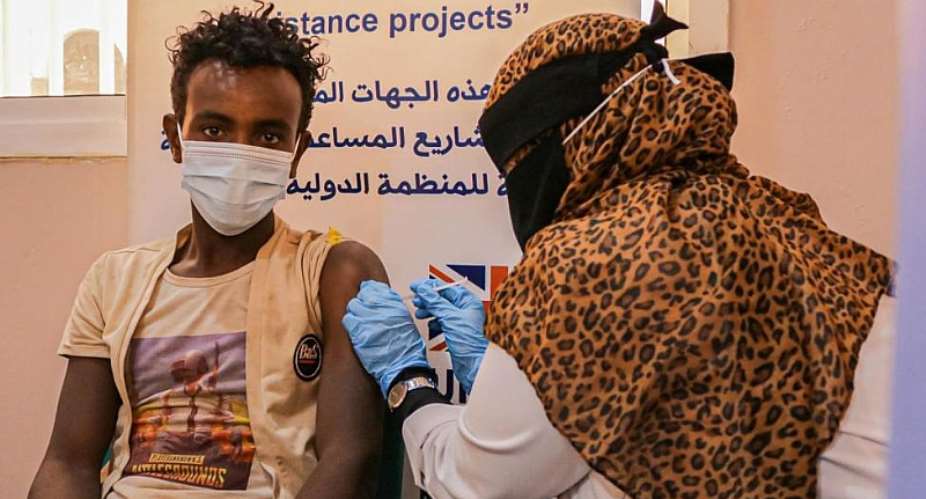Aden – The International Organization for Migration (IOM) has begun a COVID-19 vaccination campaign for migrants stranded in Yemen, aiming to inoculate around 7,500 people at its Migrant Response Points in Aden and Ma’rib. IOM continues to advocate for more efforts to protect vulnerable populations by ramping up vaccination efforts for people on the move.
“We welcome the Government’s commitment to protecting migrants against COVID-19 and immunizing people on the move is key to combatting the spread of the disease,” said IOM’s Chief of Mission, Christa Rottensteiner. “There are still not enough doses to protect everyone in Yemen from this disease. More support from the international community to supply the country with enough vaccines will save lives.”
COVID-19 has had severe consequences for the health, well-being and income of people in Yemen. As of 12 December, there have been more than 10,000 cases reported but the full impact is difficult to assess due to limited testing and reporting across the country.
Since April, the Organization has been supporting efforts by the Ministry of Health to vaccinate at-risk and hard-to-reach populations. They have included health workers, people with chronic illnesses and elderly citizens, vaccinated at IOM-supported health centres in Aden, Ma’rib and Ta’iz governorates.
One Ethiopian migrant who received the vaccine in Aden, Naima Mohammed, said: “Last year one of my relatives died from COVID-19. Since then, I've come to the Migrant Response Point several times to learn measures to avoid contracting the virus, like handwashing and mask wearing. Now that I'm vaccinated, I'm more protected.”
Seven years of conflict in Yemen have weakened the health system, which was already in peril before the virus reached the country. The pandemic has had a dire impact on the most marginalized communities who lack access to health care, clean water and sanitation.
An estimated 36,000 migrants have been stranded on their journeys due to COVID-19-related mobility restrictions, nearly 3,500 in Ma’rib. Many are sleeping rough or in overcrowded and unsanitary accommodation where the virus can easily spread.
“Vaccinating against COVID-19 is even more crucial in places like Ma’rib where ongoing conflict continues to weaken health facilities and disrupt the supply chain for medicines,” Rottensteiner said.
For the past three months, IOM has been conducting awareness-raising sessions among migrants to spread accurate information and debunk vaccine misconceptions. Vaccinated migrants will receive immunization documents which will allow them easier access to health facilities.
Since the beginning of the pandemic, IOM has helped prevent the spread of the disease and provide treatment for those infected. This includes encouraging behaviours to prevent transmission, increasing disease surveillance and testing, and securing critical supplies and personal protective equipment in health facilities.
So far this year, more than 135,000 people have been reached with COVID-19 awareness sessions and over 400,000 people have been screened for COVID-19 at IOM-supported health facilities throughout the country.
IOM’s vaccination campaign for migrants in Yemen is implemented in partnership with the Ministry of Health and the World Health Organization with support by contributions from the governments of Germany, Finland and EU Humanitarian Aid.





 Former Kotoko Player George Asare elected SRC President at PUG Law Faculty
Former Kotoko Player George Asare elected SRC President at PUG Law Faculty
 2024 elections: Consider ‘dumsor’ when casting your votes; NPP deserves less — P...
2024 elections: Consider ‘dumsor’ when casting your votes; NPP deserves less — P...
 You have no grounds to call Mahama incompetent; you’ve failed — Prof. Marfo blas...
You have no grounds to call Mahama incompetent; you’ve failed — Prof. Marfo blas...
 2024 elections: NPP creates better policies for people like us; we’ll vote for B...
2024 elections: NPP creates better policies for people like us; we’ll vote for B...
 Don’t exchange your life for wealth; a sparkle of fire can be your end — Gender ...
Don’t exchange your life for wealth; a sparkle of fire can be your end — Gender ...
 Ghana’s newly installed Poland train reportedly involved in accident while on a ...
Ghana’s newly installed Poland train reportedly involved in accident while on a ...
 Chieftaincy disputes: Government imposes 4pm to 7am curfew on Sampa township
Chieftaincy disputes: Government imposes 4pm to 7am curfew on Sampa township
 Franklin Cudjoe fumes at unaccountable wasteful executive living large at the ex...
Franklin Cudjoe fumes at unaccountable wasteful executive living large at the ex...
 I'll 'stoop too low' for votes; I'm never moved by your propaganda — Oquaye Jnr ...
I'll 'stoop too low' for votes; I'm never moved by your propaganda — Oquaye Jnr ...
 Kumasi Thermal Plant commissioning: I pray God opens the eyes of leaders who don...
Kumasi Thermal Plant commissioning: I pray God opens the eyes of leaders who don...
